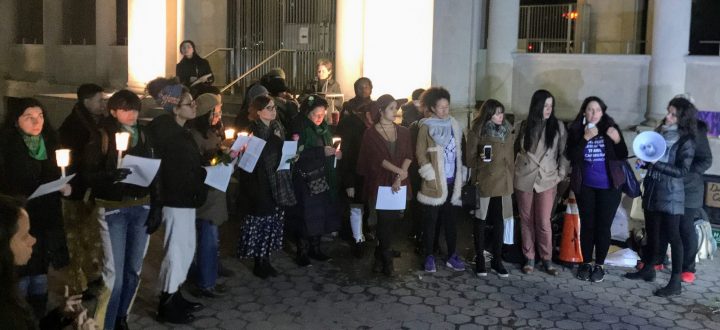Statement read publicly on November 25th in Union Square NYC during the celebration of the International Day for the elimination of violence against women.
We have come together today to honor those women we have lost at the hands of state-sanctioned violence. We are also here to celebrate survivors and the ongoing collective struggle against a system that deems our lives dispensable and targets our bodies as battle-grounds.
November 25th is, besides March 8th, one of the most important days of action for the Latin American feminist movement. In 1981, feminists meeting at the first Encuentro Feminista Latinoamericano y del Caribe in Colombia named it International Day for the Elimination of Violence against women, in honor of the Mirabal Sisters, activists killed by the Dominican dictatorship on November 25, 1960.
As part of a transnational movement-building process, Women ́s Strike NYC would like to contribute to bringing November 25th into the movement calendar in the city. With that aim, we are inviting folks mobilizing around different fronts of struggle to come together and bring to light the connections between our fights, as well as our disparate locations in the geography of global Capitalism.
Across the world, women are leading the fight against neo-extractivism and for the sustenance of life. The feminist movement, for its part, has played a crucial role in confronting the rise of right wing governments and mounting a resistance against decades of austerity politics. While unrest spreads, the backlash aimed at crushing it intensifies. One of the weapons of this reactionary offensive has been to turn the bodies of women, girls, gender non-conforming people, and other feminized subjects (such as young boys) into battle-grounds.o
All through the American continent, land and water protectors, as well as left figures and activists are increasingly being targeted for their work. The killings of Berta Caceres and Margarita Murillo, in Honduras; Cristina Batista in Colombia; Juana Raymundo in Guatemala; Marielle Franco in Brazil, are some of the most infamous cases. There are also many anonymous women activists whose bodies have been treated as war trophies. Most recently, feminists in Chile are fighting to make visible how the growing number of rapes, disappearances and murders of compañeras, in the context of the recent uprisings, have acquired the character of state policy, such as they did during the civico-military dictatorship.
While in the United State explicit political violence is less common, working class, Black women, women of color, trans women, and undocumented immigrants continue to be policed, imprisoned, abused and murdered by the police, immigration enforcement agencies like ICE and CBP, and the prision-industrial complex.
The killings of black women by the police, such as Sandra Bland, who was found dead in her cell after being pulled over for a traffic violation; Atatiana Jefferson, shot during a non-emergency wellness visit; Rekia Boyd, shot when a detective “confused” her friend’s phone with a gun; and Layleen Polanco, a trans afro-latina sex worker found dead in solitary confinement after being taken to Rikers under misdemeanor charges, have lead the Movement for Black Lives to rally at the cry of “Say her name!”.
Changes in the criminal justice system during the last decades have made the rate of growth for women imprisonment to be twice as high as that of men. At this moment, the population of incarcerated women stands nearly eight times higher than in 1980. Furthermore, more than 60% of women in state prisons have a child under the age of 18. It is widely known that, due to the gendered division of labor, the consequences of imprisoning women are devastating for families and communities.
The prison/police complex continues to function as the institutionalized management of state-sanctioned violence against the most vulnerable and exploited in our society. Over 60% of women convicted for causing violence in New York state, for instance, have actually been incarcerated for defending themselves against a male abuser; while one in three Black transgender women in the United States will experience incarceration in her life. Meanwhile, capitalism-induced poverty, homelessness, and community stress continues to intensify violence against vulnerable people in our communities.
Today’s intesified policing and mass incarceration has done nothing to stop interpersonal and intercommunity violence against women–especially Black and Indigenous women, working class women, and trans women. Hence, our feminist analysis leads us to the conclusion that we must continue to fight to abolish prisons, jails, immigration detention, civil commitment, and all forms of state-sanctioned violence, segregation, confinement, and disposability. We must work to create alternatives grounded in healing, transformative justice, and ending racism, sexism, classism, and transphobia in our communities, if we want the state-sanctioned, systematic violence to finally stop.
While the barriers for the free flow of capital become looser, working class movement across borders becomes tightly regulated and criminalized. The United States has militarized the border with Mexico and propelled a regional crack down on immigration. This is making the trip north even more costly and dangerous. Women, children and trans folks are the most vulnerable of all–some studies say that up to 80% of women that travel north through Mexico are raped on the way. Furthermore, reports suggest that sexual abuse of those in immigration detention is widespread, including abuse of children.
The immigration enforcement system kills, persecutes and incarcerates immigrants with total impunity and denies them the protection provided by basic civil rights. As humanitarian aid is criminalized and militias are given free reign to operate at the border, thousands of mostly anonymous bodies pile up in the desert. However, there are many names we do know and
want to honor this November 25th, like those of Claudia Patrica Gómez, a Mayan Ixil woman from Guatemala shot in the head by a Border Patrol agent minutes after crossing the border, as well as Roxana Hernandez, a trans woman from Honduras subjected to deplorable conditions, beatings, and deprived of medical care during immigration detention, which ultimately led to her death.










